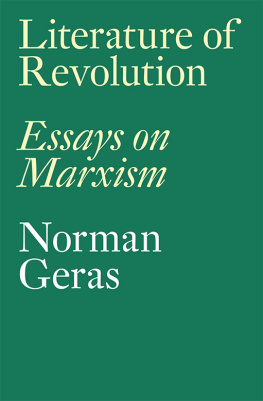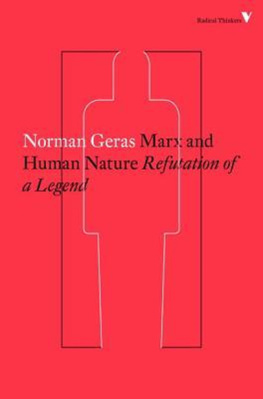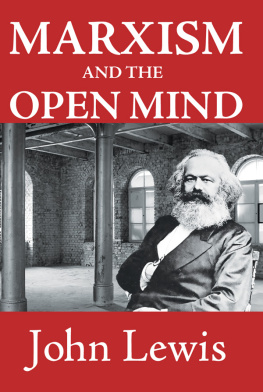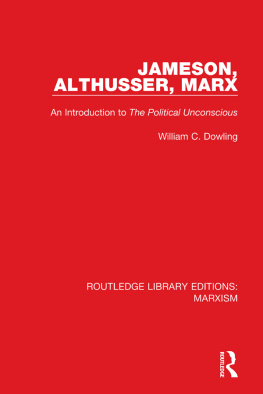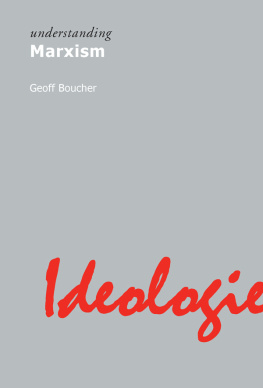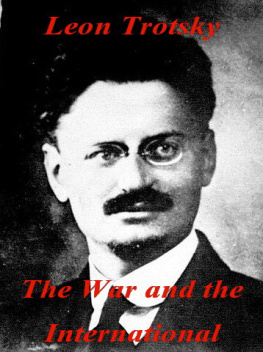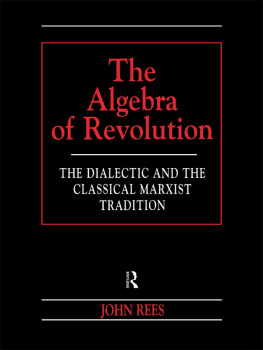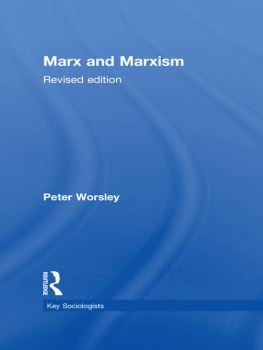
Literature of Revolution
Norman Geras
Literature of Revolution
Essays on Marxism

This edition first published by Verso 2017
First published by Verso 1986
Norman Geras 1986
All rights reserved
The moral rights of the author have been asserted
1 3 5 7 9 10 8 6 4 2
Verso
UK: 6 Meard Street, London W1F 0EG
US: 20 Jay Street, Suite 1010, Brooklyn, NY 11201
versobooks.com
Verso is the imprint of New Left Books
ISBN-13: 978-1-78663-318-7
ISBN-13: 978-1-78663-009-4 (US EBK)
ISBN-13: 978-1-78663-008-7 (UK EBK)
British Library Cataloguing in Publication Data
A catalogue record for this book is available from the British Library
Library of Congress Catalog-in-Publication Data
A catalog record for this book is available from the Library of Congress
Typeset in Plantin by Cover to Cover, Cambridge
Printed in the UK by CPI Mackays Ltd
Contents
To Michael Lwy and Morris Szeftel,
old friends by
whom I have been
encouraged.
The essays collected in this volume have appeared during the last fifteen years and deal with topics, concepts and problems in the literature of revolutionary Marxism. They are all concerned more or less directly with exposition and analysis of texts within this tradition as a platform for examining issues that have been, and continue to be, of importance. Written over the course of a decade and a half and for different purposes or occasions, naturally they vary somewhat in style and format as well as by virtue of the content and precise objectives specific to each. But there are also significant connections between them; conceptual or thematic links, continuity and progression of argument, bestowing on them a certain unity, sufficient, I believe, to justify their republication here together.
The essays fall into two groups. Those in of the book discusses the thought of Trotsky and, to a lesser extent, that of Rosa Luxemburg and Lenin as well. The focus here is on questions of socialist political theory. With one exception, and that not a complete exception, the preoccupation of the essays in this second group is with the forms of working-class action, organization and democracy.
The Controversy About Marx and Justice, with which the volume begins, is addressed to the normative foundations of Marxs thought. Immediately continuous, in that, with at least one of the major concerns of my earlier Marx and Human Nature: Refutation of a Legend, it confronts directly and at length what is also a recurring theme in several of the essays that follow it but which they only touch on much more brieflythe presence and importance of the ethical component within Marxism. The issue is approached by way of the recent debate over whether or not Marx considered capitalism to be unjust.
Central to that debate amongst many other matters raised by it is the account given by Marx in Capital of the nature of value, the wage contract and exploitation, and the distinction much used by him in giving it, between the outward appearances and the inner reality of capitalist relations of production. This distinction is the subject of the next two essays in the book. Fetishism, a very short piece written for a work of reference, is included here as introducing the argument of the longer, following piece in convenient and summary form. Essence and Appearance: Aspects of Fetishism in Marxs Capital examines the presuppositions and methodological implications of this pivotal dichotomy, draws attention to ambiguities in and common misunderstandings of it, and emphasizes both its explanatory and critical dimensions. Some of Althussers theses are criticized in the process and, in particular, his way of construing the relation between Marxist theory and the working class.
The fourth and fifth essays then centre on Althussers ideas in their own right. Louis Althusser is, again, a shorter piece, included to provide a brief summary and overview of the more extensive explanation and argument it precedes. Althussers Marxism: An Account and Assessment is, as the title of itself indicates, in large part expository, aiming for as clear a presentation as possible of some unfamiliar, some complex and some obscure ideas. The exposition of them is followed by a critique, partial rather than comprehensive, but in any case enlarging upon the matter broached earlier in the previous essay but one. Althussers theory of knowledge and science and, within it, his view of the relationship between Marxism itself and the politics and experience of the working class, are judged to be one-sided and idealist.
The grounds for this judgement are further explored in the sixth piecethe last in generally. Marxism and Proletarian Self-Emancipation discusses the principle that the liberation of the working class must be won by the working class itself, suggesting that, transparently simple as it may appear, it carries with it both assumptions and consequences of quite some moment, epistemological as well as political. The text for a brief talk, this piece only deals with these in the broadest terms, but it acts as a bridge towards the second group of essays, sketching out or anticipating issues which they treat of more thoroughly.
of the book is introduced by the essays, Leon Trotsky and Rosa Luxemburg. These condense and resume the lives and principal writings and ideas of their respective subjects, furnishing thereby some general background to the specific topics consideredwith reference to his work chiefly but by comparison or contrast with hers and also Leninsin the remainder of the volume. It may be noted that like the opening essay of the collection, the material that makes up this second part of it abuts on that of another of my books, namely, in this instance, The Legacy of Rosa Luxemburg. This is owing not just to the connecting figure of Luxemburg herself but to a substantial number of continuous preoccupations, cognate and overlapping themes, arising from the common concern with problems of revolutionary politics.
Political Participation in the Revolutionary Thought of Leon Trotsky, first of the longer items in this section, examines Trotskys views on the modes of working-class political activity and organization, focusing especially on the relationship between party and class. Across the writings and a span of nearly forty years, it traces the development of his thinking on these matters, recording changes of both emphasis and substance, crucial amongst them the mutation and certain nuances in his assessment of the conceptions of Lenin. The relation between the pertinent ideas of the two revolutionaries is then directly the subject of Lenin, Trotsky and the Party. In more informal accents due to its origin as a talk, this seeks to isolate the lastingly valid core in Lenins theory of party organization from his more peripheral or circumstantial formulations, theoretical infelicities and mistakes; and likewise to distinguish in the young Trotskys, and in Luxemburgs, criticisms of him the valuable insights from a broader error of political judgement.
These same criticisms form the starting point of the next essay, Classical Marxism and Proletarian Representation. They are the material for reflection on a problem secreted in the two preceding piecesand in The Legacy of Rosa Luxemburgunsettled and unsettling within their stress upon the democratic norms necessary and proper to the workers movement; a problem, indeed, recognized here as running the length of the Marxist tradition. It concerns the democratic and pluralist commitment of classical Marxism: the tension between that and its habitual way of talking about class and party. Through close analysis of the texts in which Trotsky and Luxemburg set forth their strictures of Lenin and some reference back to the writings of Marx and Engels, the essay brings this problem into the open, proffers some tentative hypotheses about its theoretical and historical roots, and identifies the boundary that must be crossed as a precondition of resolving it.

